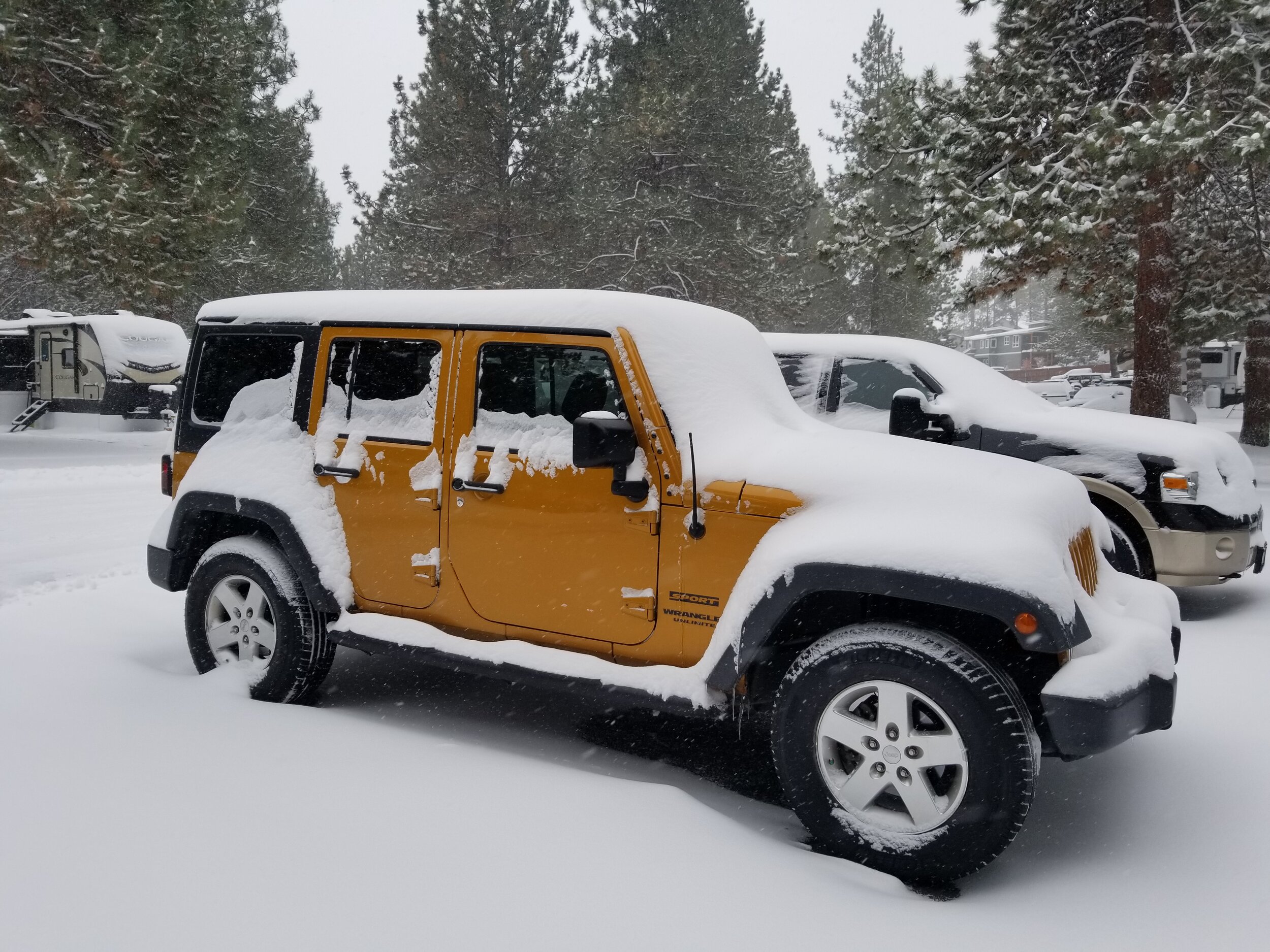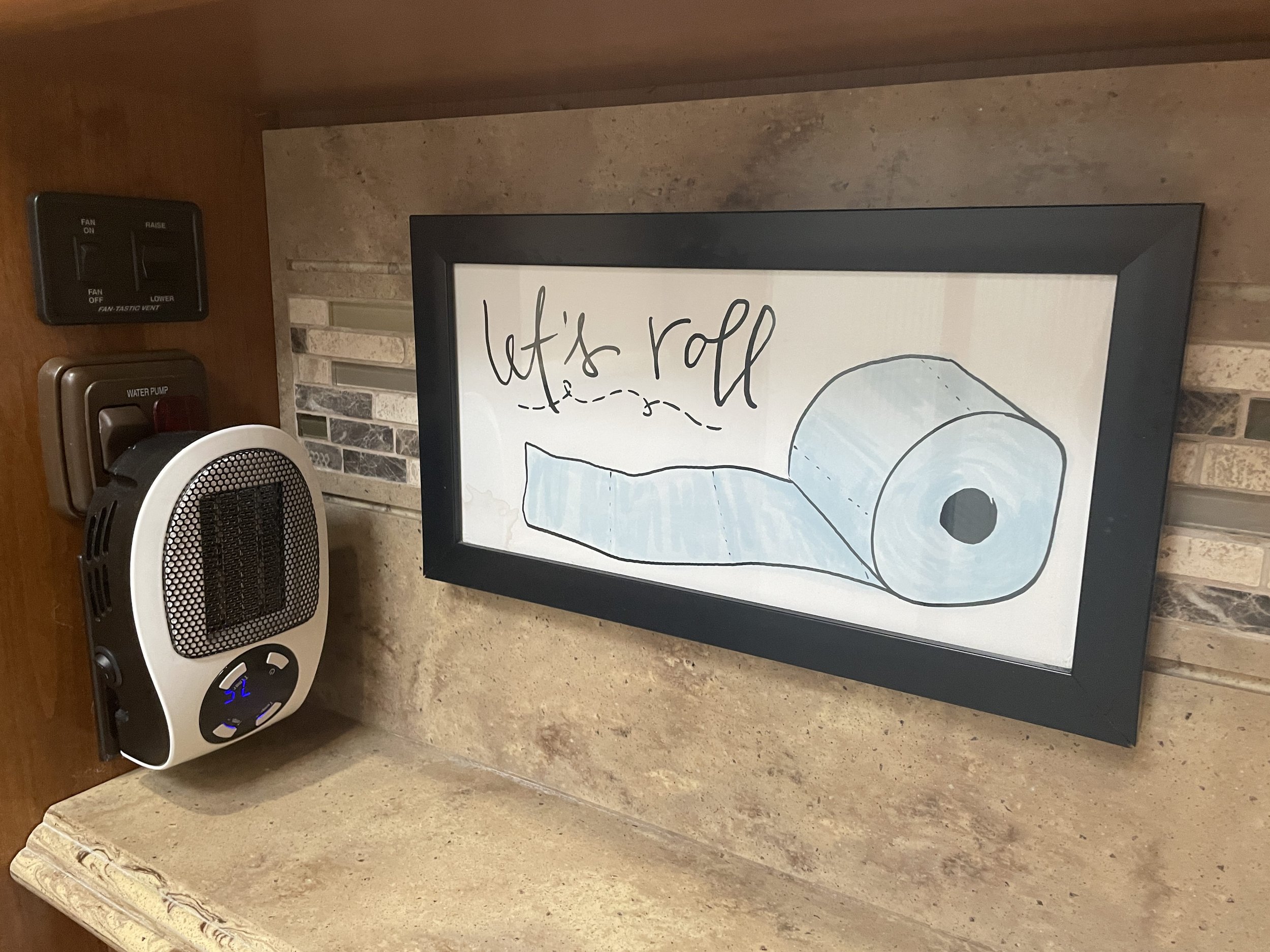How to keep your RV warm in winter
It was only October, but we were experiencing below-freezing temperatures in Oregon already, sometimes as low as single digits while boondocking where we didn’t have a steady source of big power. Challenging to be sure! Don’t have time to read this now? Pin it for later! We only recommend products we love and your support means a lot to us! This post contains affiliate links and if you make a purchase after clicking on our links we will receive compensation at no additional cost to you. UPDATED 3/16/2022
To keep your RV warm in winter, you can use several different heat sources depending on whether you are plugged into shore power or boondocking using your generator. Our sources include:
1) Two built-in furnaces
2) Two heat pumps in the roof AC units
3) Built-in electric fireplace
4) Presto heat dish
5) Mr. Heater Buddy portable propane heater
6) Heated mattress pad
7) Wall Outlet Electric Heater
Furnaces
Our 2014 Tiffin Phaeton comes with two built-in furnaces. The front/mid is a large 35,000 BTU unit that heats the front/midsection and the smaller 20,000 BTU unit underneath the rear closet heats the bedroom, bathroom, and also the underneath compartments that contain the fresh/grey/black tanks. The high BTU ratings mean the furnaces are the quickest way to heat the motorhome. They feel the warmest since the ample heat comes down from vents near the floor. The drawbacks would be the fans in them are somewhat noisy and furnaces are big consumers of propane (about 1 gallon every two to three hours depending on whether you are using one or both furnaces). On the plus side, they do not require you to be onshore power or use the generator, and the fans use only about 6-7 amps in each furnace which does not draw down your battery banks quickly so they are good for boondocking. They also vent to the outside so they do not contribute to creating a moisture/condensation problem inside. If it’s going to drop below freezing, we do set the rear furnace to 50 which will keep the bedroom from getting too cold and also sends warm air to the holding tanks, although we think it’s debatable how effective that is at keeping things from freezing over.
Heat Pumps
The two roof air conditioning units (Coleman Mach 8 Plus) on our motorhome also have built-in heat pumps that provide 15,000 BTU each. These are power-hungry so they require shore power or the generator to run. Due to the design, they become less effective the colder it gets but they are more efficient than electric space heaters like the two mentioned below since they are moving heat from outside to inside. Once the outside temperature drops below 40 degrees F they will barely work at all and once it’s below freezing, forget it. Also, we discovered there is a trick to use them without the thermostats also automatically turning on the gas furnaces (Hint: the thermostat temperature setting has to be no more than 4 degrees higher than the room temp so you have to babysit it). They are just as noisy as when running in air conditioning mode and they take a few minutes before they really start warm-up, and even though with both running they produce nearly the same heat as the front main furnace, they just do not feel as warm for some reason. We’ve found the main use case for these is if the temperature is above 40 and you are not paying for your electricity. They work well in that scenario.
Electric Fireplace
Our motorhome has an integrated electric fireplace with a thermostat. It’s essentially a 1,000-watt space heater producing 3,415 BTU of heat and runs virtually silently. We often use this as our primary heat source if we are onshore power, not paying for electricity, and it’s only slightly cold. It can keep the chill off and we oftentimes run it overnight to keep a pleasant temperature all day long without the noise of using the heat pumps. We also feel it is safe enough to use while we are gone to keep the cats warm.
Presto Heat Dish
We use this 1000 watt parabolic heat dish to supplement the electric fireplace when we are not paying for electricity due to the high wattage. It will also work while the generator is running. While you can power it with your inverter from the battery bank, the high wattage will drain even the biggest battery banks in a couple of hours. Rather than heating the whole motorhome, it focuses 3,415 BTU of heat on the specific area you are in. With the dish about five feet away pointing at you, it’s like sitting in front of a fireplace. Often times we’ll set this up on the floor in the bedroom if it’s really cold and the fireplace, which is more towards the front, is not enough. If you set the heat dish low enough that it is cycling on and off, the repetitive noise of the heating element warming up can be annoying. On occasion, we’ve even used it with an extension cord outside in lieu of a campfire or fire pit. Again, I’d only use this if the heat pumps are not an option.
Mr. Heater Buddy
Mr. Heater Buddy is a 4,000-9,000 BTU portable propane heater. It runs off the 1 lb green bottles that a lot of tabletop camp stoves & BBQs use. The low mode provides 4k BTU of heat and will empty a 1 lb bottle in about 8-10 hours. The high setting is 9k BTU but the bottle now only lasts about 2-3 hours. With the right adapter hose, you can also connect it to a standard 15-20lb+ propane tank. Ideally, the extension hose is long enough that you can leave the tank outside for safety reasons and still place the heater where you want. We believe this is the ideal boondocking heater since it does not need any electric power and is 100% efficient using propane. The drawbacks are it does create some moisture and consumes oxygen so you must keep a vent cracked, but it does have a low oxygen shutoff and tip-over protection. For safety reasons, we do not use it while we are sleeping. Alternatively, and probably the best solution, is to have a professional tap into your existing propane system and run a connection inside so you’re not running through bottles or external tanks too fast. Make sure you also have a propane detector too inside. There is also a larger “Big Buddy” unit that goes up to 18,000 BTU and also has a low pressure quick connect that more easily taps into your existing RV propane system.
Heated Mattress Pad
Unless we are staying at a campground that has electricity included, we tend to turn off most of the above heat sources overnight and rely on our heated mattress pad. That along with one or two blankets or comforters is all we need to be nice and toasty under the covers. Our thinking is that there is no point in heating up the entire motorhome overnight while we are sleeping since we don’t benefit much from it except maybe when you get up to go to the bathroom. This is boondocking friendly too since the heated mattress pad doesn’t use a lot of power.
Wall Outlet Electric Heater
Keep your RV bathroom or any small bathroom warm with this Wall Outlet Electric Heater
Updated 3/16/2022: In January 2022 we added a new device to our heating sources. We were going to be spending a few months in Colorado, South Dakota, and North Dakota where we knew it was going to be cold and drop into the single digits. We added this Wall Outlet Electric Heater to our bathroom and Jeri couldn’t be happier. No more getting out of your nice hot shower into a freezing cold room. We set this heater to 75 degrees and it has made all the difference in our bathroom.
Conclusion
There are several different heat sources depending on whether you are plugged into shore power or boondocking using your generator that you can use to keep your RV warm. These include built-in furnaces, heat pumps in the roof AC units, built-in electric fireplace, presto heat dish, Mr. Heater Buddy portable propane heater, and heated mattress pad.
If it’s going to be that cold for more than a couple of hours, there are some additional steps we take to keep our freshwater lines and holding tanks from freezing. Read about those steps in our How to keep RV pipes and holding tanks from freezing article.
Want more RV repair and maintenance information? Take a look at our Motorhome articles. What are we doing next? Don’t miss an article, subscribe today.










